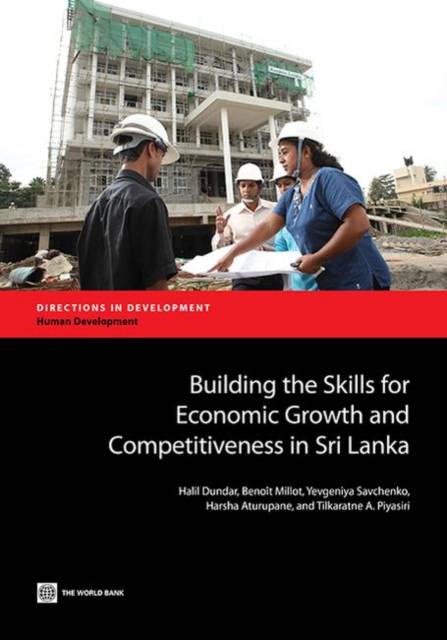
- Retrait gratuit dans votre magasin Club
- 7.000.000 titres dans notre catalogue
- Payer en toute sécurité
- Toujours un magasin près de chez vous
- Retrait gratuit dans votre magasin Club
- 7.000.0000 titres dans notre catalogue
- Payer en toute sécurité
- Toujours un magasin près de chez vous
Building the Skills for Economic Growth and Competitiveness in Sri Lanka
Halil Dundar, Benoit Millot, Yevgeniya Savchenko
39,95 €
+ 79 points
Description
"Despite armed internal conflict and the global financial crisis, Sri Lanka has made remarkable progress in recent years, enjoying healthy economic growth and substantially reducing poverty. Moreover, Sri Lankans are the best-educated people in South Asia, with widespread access and high completion rates in primary and secondary education. Economic growth and structural changes in the economy, however, make skills development imperative as Sri Lanka implements its plan-the Mahinda Chintana (MC)-to become a regional hub in strategic economic areas. . Yet skills shortages and mismatches are widespread, and firms with undereducated employees and a shortage of skilled labor are less productive. An effective skills development system will help diversify the economy; improve labor productivity and competitiveness; give the country the flexibility it needs to compete effectively in the global economy; and further reduce poverty. As Sri Lanka moves from a factor-driven to an efficiency-driven economy, its workforce is shrinking even as demand for skills-especially sophisticated skills-is rising. Unfortunately, Sri Lanka has been slow to expand technical and vocational education and training (TVET) and tertiary education. Responsibility for TVET is fragmented; the system is supply-driven; there is a shortage of reliable information on labor market skills demand and supply; employers are sidelined; and the resources invested are not linked to performance. The MC recognizes the severity of the skills constraint and highlights the importance of investing in workforce skills to raise both productivity and competitiveness. This report analyzes skills demand and supply in Sri Lanka and scrutinizes how skills are formed, the factors shaping skills demand, and the responsiveness of the system. Finally, it offers suggestions for how skills development can be improved so that Sri Lanka can meet its economic growth and poverty reduction goals."
Spécifications
Parties prenantes
- Auteur(s) :
- Editeur:
Contenu
- Nombre de pages :
- 234
- Langue:
- Anglais
- Collection :
Caractéristiques
- EAN:
- 9781464801587
- Date de parution :
- 22-05-14
- Format:
- Livre broché
- Format numérique:
- Trade paperback (VS)
- Dimensions :
- 178 mm x 254 mm
- Poids :
- 417 g

Les avis
Nous publions uniquement les avis qui respectent les conditions requises. Consultez nos conditions pour les avis.






